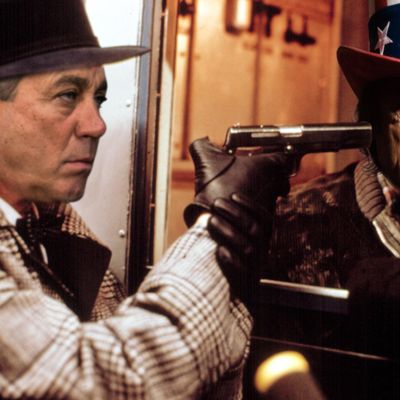
Entering into the final few days of the economic and constitutional crisis, the outcome remains uncertain and unsettled. Last night, the Senate appeared poised to end the government shutdown and lift the debt ceiling. The plan was for the Senate bill to attract a wide, bipartisan vote, and as the debt-ceiling deadline approached, force the House, which has passed nothing, to accept its plan.
Even a lot of sophisticated observers have failed to grasp why this isn’t a ransom:
Let me explain. The crucial fact about of the emerging Senate plan is that it fulfills the core Democratic demand that the debt ceiling not be ransomed for policy concessions. Democrats prefer to simply lift the debt ceiling, or abolish it altogether. For the sake of appearance, Republicans have asked to tie policy changes onto the debt-ceiling bill. But Democrats have insisted they won’t pay a ransom: The policy changes must be reciprocal. The Senate compromise accommodates that, by adding on two changes — beefed-up Obamacare income verification and the delay of a small tax — which are both minor in nature and a trade Democrats would have made without a debt-ceiling threat. Attaching mutually acceptable deals onto debt-ceiling hikes is historically normal. Using the debt ceiling as a hostage to force a party to accept policies it doesn’t like is not.
That deal has not yet been finalized. Politico floated the possibility that the two Obamacare provisions may be removed, which underscores the fact that the Senate is keeping the tit-for-tat structure of the bargain. Republicans could also ask for a bigger add-on — suspending the medical device tax — but then Democrats would need a correspondingly larger add-on of their own.
The principle undergirding the emerging Senate bill — ending hostage tactics, and making all deals reciprocal — is unacceptable to House Republicans, who want to preserve debt-ceiling hostage-taking as a form of policy leverage. So, rather than wait for the Senate to act on its own, the House is attempting to move its own bill, which demands a small ransom: suspending the medical device tax, and eliminating employer health-care subsidies for congressional staff. The ransom is minor, but preserves the principle that the House can use the threat of default to force the president to accede to otherwise unacceptable policy demands, without making any policy concessions of its own.
But the House is a chaotic, bizarre chamber, and any number of things could happen. Jake Sherman reported a week ago that Boehner has told fellow Republicans he has “something up his sleeve.” The most chilling possibility, floated this morning by a source to National Review’s Ramesh Ponnuru, is that the House could pass its small-ransom bill and then leave town. No other sources have confirmed this speculation yet, but it would be an incredibly dangerous form of brinksmanship. Leaving town after passing the bill would make the small ransom the House’s final offer before default. It would force the Obama administration either to sign the bill, and make debt-ceiling extortion a permanent part of the new constitutional architecture, or else allow default. The game here would be to force Obama to be complicit in an excruciating dilemma constructed by the House Republicans:
That’s the most dangerous possibility, but not the only one. A second possibility is that the small ransom bill could fail the House — not because it’s a ruthless and irresponsibly dangerous form of brinksmanship, of course, but because the ransom isn’t big enough. Some conservatives are already complaining. If all Democrats oppose the House bill (which seems likely), it would take just seventeen defections to make it fail. A previous House Republican debt-ceiling-ransom bill failed because, even though it demanded that Obama enact most of Mitt Romney’s agenda, it didn’t go far enough for the Ted Cruz wing of the House. John Boehner is already scrambling to find a version of his bill that can pass. If the Cruz wing sinks the bill, it would rule out the Joker-barge-explosive scenario.
Predicting the outcome of the House bill is guesswork at this point. House leaders have said they won’t even try counting up its votes in advance. Primatologists have been reduced to scrutinizing gestures and mood around the House, including such details as the fact that House Republicans sang “Amazing Grace” before their morning meeting. (“Amazing Grace” is a song by a repentant slaveowner, which is appropriate given that Obamacare is the worst thing since slavery.)
A third possibility is that the House passes its bill, but Boehner doesn’t leave town. That would leave matters in roughly the same place as scenario No. 2. The House would have passed a bill Obama can’t sign, and the Senate will have passed a bipartisan bill he can sign, forcing Boehner to either give in and pass the Senate bill at the last minute or allow default. Boehner has previously told colleagues he won’t allow default, which would imply he is trying to show his conservative members he’s fighting the good fight before giving in at the last possible moment.
The House’s small-ransom bill has ratcheted its demands way down from its original level. The only point of the demands is to maintain the precedent that the House can hold the debt ceiling hostage. But of course the chaos and frenetic timing of the events serve only to show why it is so crucial that Democrats — or any sane American — not allow this precedent to be enshrined. The white-knuckle terror being inflicted on the world economy is the conservative movement’s vision of how divided government should be conducted from now on. Paying even a tiny ransom now means that debt-ceiling ransoms will continue in perpetuity until one party finally miscalculates and the explosives go off.






























